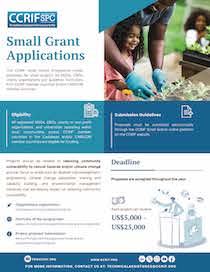May 27, 2009 ― Against the background of the impending Atlantic Hurricane Season, the Caribbean Catastrophe Risk Insurance Facility (CCRIF) today released a briefing document outlining the role of risk management in the region's adaptation strategy in the face of climate change. The briefing was prepared by Caribbean Risk Managers Ltd in support of the CCRIF Chairman's contribution to a discussion session forming part of the Caribbean Development Bank (CDB) Board of Governors' meeting in the Turks & Caicos Islands. The purpose of the document is to examine ways in which the region can implement best practice in sovereign risk management to continue in the proactive management of natural hazards risks. It also explores the inter-linkages between many aspects of the region’s risk landscape both at a national and regional level.
"As a strong supporter of risk mitigation as a way to achieve economic targets, the Caribbean Development Bank takes much interest in the effects that natural disasters can have on the sustainable development of the region," Warren Smith, Director of Finance and Corporate Planning at the CDB said. "The Caribbean's high exposure to hurricanes and other climate-related hazards, the specific natural and social conditions which many small island states operate within, as well as the increased loss tally due to natural disasters over the past 15 years, point to a continued need for climate change adaptation within a holistic sovereign risk management framework." Among the needs identified by the study include the development of national risk registries and risk ‘maps’ which detail the likelihood and potential severity of all risks faced by an individual country, along with their interconnectivity, as well as the potentially critical role of a 'Country Risk Officer' in coordinating risk management activities throughout the government and with regional counterparts. In his presentation at the CDB board meeting, Milo Pearson, Chairman of the CCRIF board, summarised the key findings of the report: "Investing in adaptation initiatives that reduce the impact of climate change is absolutely essential for the future viability and sustainability of the economies of the Caribbean. Risk management and, by extension, the utilisation of risk management tools and mechanisms, will be critical in ensuring that effective adaptation measures against climate change are made, even within the context of constrained resources and budgetary pressures. Although risk management is not the complete solution to the problems being created for the Caribbean people and economies by climate change, it does provide an important framework within which more informed decisions can be made regarding investments in adaptation and mitigation measures." The entire report is available online at http://ccrif.org/main.php?main=27 under ‘Reports’
About the CCRIF: The CCRIF is the first multi-country risk pool in the world, and is also the first insurance instrument to successfully develop a parametric policy backed by both traditional and capital markets. It is a regional insurance fund for Caribbean governments designed to limit the financial impact of catastrophic hurricanes and earthquakes to Caribbean governments by quickly providing financial liquidity when a policy is triggered. Sixteen governments are members of the fund: Anguilla, Antigua & Barbuda, Bahamas, Barbados, Belize, Bermuda, Cayman Islands, Dominica, Grenada, Haiti, Jamaica, St. Kitts & Nevis, St. Lucia, St. Vincent & the Grenadines, Trinidad & Tobago and the Turks and Caicos Islands. Last year the CCRIF paid out approximately US$6.3M to the Turks and Caicos Islands in the aftermath of Hurricane Ike. Caribbean Risk Managers Ltd, the risk management arm of the CGM Gallagher Group ― the Caribbean's largest insurance broker, is the Facility Supervisor of the CCRIF.





